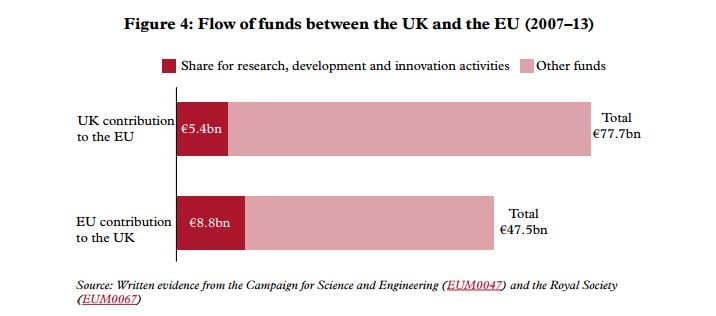The Commission said it is “far too early to speculate” on the UK’s long term access to the €80 billion Horizon 2020 fund, or indeed any other conditions of its future relationship with the EU, until article 50 of the Lisbon Treaty is triggered and negotiations can officially begin.
“For the time being, nothing changes. EU law continues to apply to the full to the UK and in the UK until it is no longer a member. And since the UK remains a member state, legal entities from the UK are eligible to participate and receive funding in any Horizon 2020 action,” the Commission’s spokesperson for research, science and innovation said in a statement.
This may be the official line from Brussels, but stories have already emerged about UK researchers being taken off EU projects.
One past nutrition research project to benefit from EU funding is the University of Aberdeen-coordinated Full4Health, which sought to understanding food-gut-brain mechanisms across the lifespan in the regulation of hunger and satiety.
Meanwhile the five-year project SATIN (SATiety INnovation) coordinated by the University of Liverpool received €6m from the EU fund before Horizon 2020, the 7th Framework Programme.
'I regret to inform you'
Professor Paul Crowther, head of the department of physics and astronomy at the University of Sheffield, spoke out last week about the experience of an unnamed colleague.
He claims on 21st July a coordinator for an EU consortium said in an email: “I regret to inform you that in the end we decided to not include your group in the consortium. The main reason of this decision concerns the Brexit and all the incertitude it brings. It may seem a very drastic decision, but we decided to ‘remove’ the problem at the base.”
Addressing the issue at the Euroscience Open Forum at the end of July, research, science and innovation commissioner Carlos Moedas acknowledged the “great deal of uncertainty about what the future holds” but said Horizon 2020 projects would continue to be evaluated based on “merit and not on nationality”.
“So I urge the European scientific community to continue to choose their project partners on the basis of excellence.”
But Professor Crowther’s example would suggest this message is not be carried forward in practice - and perhaps it should come as no surprise.
Competition for a slice of the €80 billion research and innovation fund is tough enough as it is, with a success rate of around 16%.

Question time
The issue drove three concerned British Members of European Parliament (MEPs) Molly Scott Cato, Julie Girling and Clare Moody to submit a joint European parliamentary question to the Commission asking for assurances UK researchers and institutions would not be prematurely cut off from funding.
The trio said the South West region of England alone previously received just under €600m from the Horizon 2020 programme, with Bristol University receiving over €140m.
They pointed out that until the UK comes officially out of the EU, it continues to contribute to the EU’s budget and should continue to be eligible for funding streams.
They said “many researchers” have reported to have already been taken off bids since the referendum on 23rd June.
They asked the Commission how these decisions to remove UK researchers from bids were being made and who was monitoring the situation in the Commission.
There has been concern too for the status of European researchers working in the UK.

Europeans in the UK
Professor and director of the University of Surrey’s Food, Consumer Behaviour and Health Research Centre Monique Raats told us on a personal level she had been saddened by the referendum result as a Dutch citizen living and working in the UK for over 27 years.
Professionally she said there was also much to be sad about.
“Much of my research funding has come from the EU and I have also had the opportunity to study European policy processes. The way in which I will be able to do this in the future looks set to change,” said Raats, who was one of the researchers behind the 14-partner EU-funded CLYMBOL consortium.
“The impact [of Brexit] has the potential to be very big for institutions like universities and staff working with them as educators, researchers and those contributing to policy and innovation processes. The rules of engagement look set to change. Any impact on the economy at large will also impact on science and its funding.”
Long term plan needed
One UK space researcher Dr David Robinson has launched a petition to make access to EU science funding key in any Brexit deal negotiations. The petition currently has 36,000 signatures.
The UK government responds to any petition with at least 10,000 signatures, and if this reaches 100,000 it will be considered for debate in parliament.
There could be two years of negotiations before the UK comes out of the EU, and this will only begin once the new UK Prime Minister Theresa May triggers article 50.
If the UK fails to secure continued access, however, this would leave a substantial funding gap.

According to figures quoted in a pre-referendum House of Lords report, between 2007 and 2013, the UK received €48bn overall in funding from the EU. Of this, €8.8bn was for research, development and innovation.
Meanwhile the UK contribution to the EU over the same period was €78bn, of which an estimated €5.4bn was indicated as for the EU’s R&D budget.
For science at least the UK was getting €3.4bn more back from the EU than it was putting it.
"When these figures are considered, it can be determined that a little under one fifth (18.3%) of the funds the UK received from the EU between 2007– 13 was used to support science and research. Clearly, science and research are a significant dimension of the UK’s membership of the EU," the report said.
The question now is, long-term, will the UK government be willing to invest in the area as heavily as the EU powers that be?
